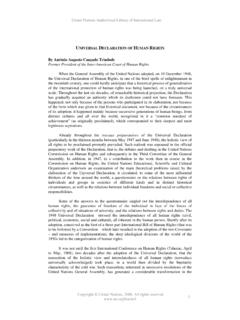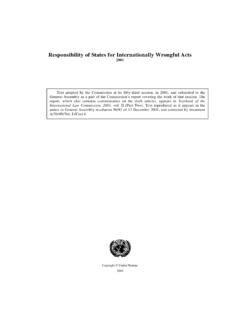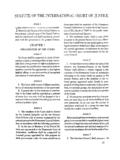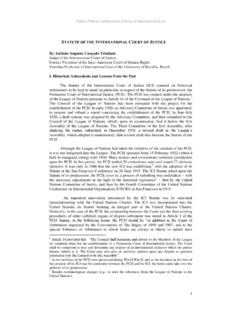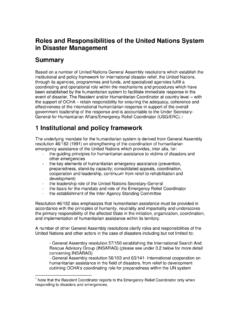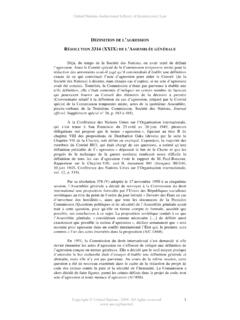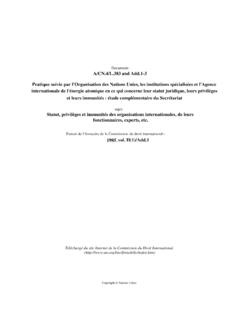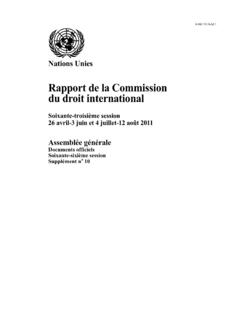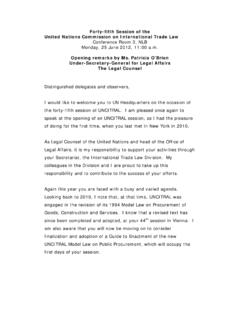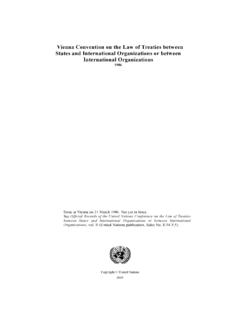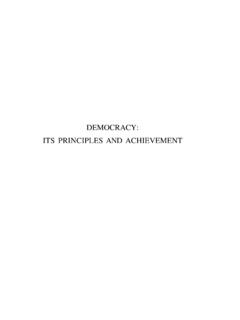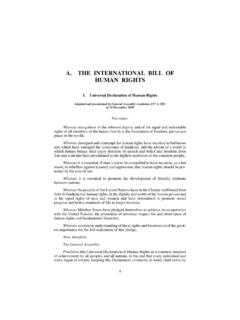Transcription of Draft Declaration on Rights and Duties of States, 1949
1 Draft Declaration on Rights and Duties of States with commentaries 1949 Copyright United Nations 2005 Text adopted by the International Law Commission at its first session, in 1949, and submitted to the General Assembly as a part of the Commission s report covering the work of that session. The report, which also contains commentaries and observations on the Draft Declaration , appears in Yearbook of the International Law Commission, 1949. Text reproduced as it appears in the annex to General Assembly resolution 375 (IV) of 6 December 1949.
2 Report to the General Assembly287 Declaration as a whole was finally adopted byeleven votes to Draft Declaration as drawn up by the Com-mission reads as follows: Draft Declaration ON RIGHTSAND Duties OF STATESW hereas the States of the world form a com-munity governed by international law,Whereas the progressive development of inter-national law requires effective organization of thecommunity of States, Whereas a great majority of the Slates of theworld have accordingly established a new inter-national order under the Charter of the UnitedNations.
3 And most of the other States of theworld have declared their desire to live withinthis order,Whereas a primary purpose of the United Na-tions is to maintain international peace and secur-ity, and the reign of law and justice is essentialto the realization of this purpose, andWhereas it is therefore desirable to formulatecertain basic Rights and Duties of States in thelight of new developments of international lawand in harmony with the Charter of the UnitedNations,The General Assembly of the United Nationsadopts and proclaims thisDeclaration of Rights and Duties of StatesArticle 1 Every State has the right to independence andhence to exercise freely.
4 Without dictation by any21 After the vote on the Draft Declara-tion, Mr. Vladimir M. Koretsky and Mr. Mauley , who voted against it, made statements in expla-nation of their Korelsky declared that he voted against the draftdeclaration because of its many shortcomings including,in particular: (1) that it deviated from such fundamentalprinciples of the United Nations as the sovereign equalityof all the Members thereof and the right of self-determi-nation of peoples.
5 (2) that it did not protect the interestsof States against interference by international organiza-tions or groups of States in matters falling essentiallywithin their domestic jursidiction; (3) that it did notset out the most important duty of States to take mea-sures for the maintenance of international peace andsecurity, the prohibition of atomic weapons, and thegeneral reduction of armaments and armed forces, andthat, further, the Draft Declaration did not proclaim theduty of States to abstain from participation in anyaggressive blocs such as the North Atlantic Pact and theWestern Union.
6 Which under the cloak of false phrasesconcerning peace and self-defence were actually aimedat preparing new wars; (4) that the Draft Declarationignored the most important duty of States to take mea-sures for the eradication of the vestiges of fascism andagainst the danger of its recrudescence; (5) that the draftDeclaration ignored the most important duty of Statesnot to allow the establishment of any direct or indirectother State, all its legal powers, including thechoice of its own form of text was derived from articles 3 and 4 of thePanamanian 2 Every State has the right to exercise juris-diction over its territory and over all personsand things therein.
7 Subject to the immunitiesrecognized by international text was derived from article 7 of the Pana-manian Draft . The concluding phrase is a safeguardfor protecting such immunities as those of diplomaticofficers and officials of international was made in the discussions to Article 105of the Charter of the United Nations, and to the morerecent implementation of that 3 Every Stale has the duty to refrain from in-tervention in the internal or external affairs ofany other substance of this text.
8 Which was derived fromarticle 5 of the Panamanian Draft , has already foundplace in various international 4 Every State has the duty to refrain from foment-ing civil strife in the territory of another State,and to prevent the organization within its terri-tory of activities calculated to foment such text was derived from article 22 of the Pana-manian Draft . The principle has been enunciated invarious international of the Rights of citizens or the establishmentof direct or indirect privileges for citizens on accountof their race or nationality, and not to allow any advo-cacy of racial or national exclusiveness or of haired andcontempi.
9 ; (6) that the Draft Declaration did not recitethe most important duty of States to ensure the effect-iveness of fundamental freedoms and human Rights ,notably tiie right to work and the right to be protectedagainst unemployment, ensured on the part of the Slateand society by such measures as would provide widepossibilities for all to participate in useful work and aswould prevent unemployment. Mr. Koretsky addedthat the Draft Declaration , and especially article 14thereof, went even further than the Panamanian draftin denying the sovereignty of States, In his view thedoctrine of the " super-State " was being resorted to inthis fashion by persons or peoples seeking to achieve, orto help others to achieve, world domination.
10 Insteadof reinforcing the principles of sovereignty, self-determi-nation sovereign equality of States, independence, andthe freedom of States from dependence upon otherStates, the Draft Declaration , he thought, derogatedfrom the great movements to rid the peoples of theworld of the scourges of exploitation and oppression( , pages 13-14).Mr. Hudson stated that he voted against the draftDeclaration because the provisions of its article 6 wentbeyond the Charter of the United Nations, and beyondinternational law at its present stage of development( , pages 3 and 6).
